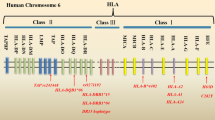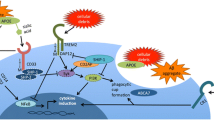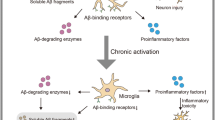Abstract
Background: Common polymorphisms of genes controlling inflammation-modulating cytokines and acute-phase proteins which play important roles in the pathogenesis of Alzheimer’s disease (AD) have been shown to be associated with AD. Aims: The immunological and immunogenetic markers potentially useful for the AD risk evaluation and diagnosis are briefly reviewed. Conclusion: The state-of-the-art of immunological and immunogenetic markers of AD indicates that new tools and strategies are necessary to identify gene products useful as diagnostic tools.
Similar content being viewed by others
References
Nussbaum RL, Ellis CE. Alzheimer’s disease and Parkinson’s disease. N Engl J Med 2003; 348: 1356–64.
Consensus report of the working group on: Molecular and biochemical markers of Alzheimer’s disease. Neurobiol Aging 1998; 19: 109–16.
Teunissen CE, de Vente J, Steinbusch HW, et al. Biochemical markers related to Alzheimer’s dementia in serum and cerebrospinal fluid. Neurobiol Aging 2002; 23: 485–508.
in t’Veld BA, Ruitenberg A, Hofman A, et al. Nonsteroidal antiinflammatory drugs and the risk of Alzheimer’s disease. N Engl J Med 2001; 345: 1515–21.
Licastro F, Chiappelli M. Brain immune responses cognitive decline and dementia: relationship with phenotype expression and genetic background. Mech Ageing Dev 2003; 124: 539–48.
Lio D, Licastro F, Scola L, et al. Interleukin-10 promoter polymorphism in sporadic Alzheimer’s disease. Genes Immun 2003; 4: 234–8.
Franceschi C, Valensin S, Lescai F, et al. Neuroinflammation and the genetics of Alzheimer’s disease: The search for a pro-inflammatory phenotype. Aging Clin Exp Res 2001; 13: 163–70.
Lee YB, Nagai A, Kim SU. Cytokines, chemokines, and cytokine receptors in human microglia. J Neurosci Res 2002; 69: 94–103.
Licastro F, Candore G, Lio D, et al. Innate immunity and inflammation in ageing: a key for understanding age-related diseases. Immun Ageing 2005; 2: 8–23.
Candore G, Balistreri CR, Colonna-Romano G, Lio D, Caruso C. Major histocompatibility complex and sporadic Alzheimer’s disease: a critical reappraisal. Exp Gerontol 2004; 39: 643–50.
Combarros O, Llorca J, Sanchez-Guerra M, Infante J, Berciano J. Age-dependent association between interleukin-1A (-889) genetic polymorphism and sporadic Alzheimer’s disease. A metaanalysis. J Neurol 2003; 250: 987–9.
Grimaldi LM, Casadei VM, Ferri C, et al. Association of early-onset Alzheimer’s disease with an interleukin-1alpha gene polymorphism. Ann Neurol 2000; 47: 361–5.
Li R, Yang L, Lindholm K, et al. Tumor necrosis factor death receptor signaling cascade is required for amyloid-beta protein-induced neuron death. J Neurosci 2004; 24: 1760–71.
Uberti D, Cantarella G, Facchetti F, et al. TRAIL is expressed in the brain cells of Alzheimer’s disease patients. Neuroreport 2004; 15: 579–81.
Caruso C, Franceschi C, Licastro F. Genetics of neurodegener-ative disorders. N Engl J Med 2003; 349: 193–4 (Letter).
Lio D, Caruso C. IL-10, Genetic polymorphism and its relevance to age-related diseases. In Marincola FM, ed. Interleukin 10. Eurekah.com 2004; 3.4: 1–14.
Caruso C, Candore G, Colonna-Romano G, Lio D, Franceschi C. Inflammation and life-span. Science 2005; 307: 208–9 (Letter).
Neale BM, Sham PC. The future of association studies: gene-based analysis and replication. Am J Hum Genet 2004; 75: 353–62.
Zhang R, Barker L, Pinchev D, et al. Mining biomarkers in human sera using proteomic tools. Proteomics 2004; 4: 244–56.
Cagnin A, Brooks DJ, Kennedy AM, et al. In-vivo measurement of activated microglia in dementia. Lancet 2001; 358: 461–7.
Author information
Authors and Affiliations
Corresponding author
Additional information
This work was presented at the “International Meeting — The Aging People”, Pavia, 2–4 September 2004.
Rights and permissions
About this article
Cite this article
Lio, D., Scola, L., Romano, G.C. et al. Immunological and immunogenetic markers in sporadic Alzheimer’s disease. Aging Clin Exp Res 18, 163–166 (2006). https://doi.org/10.1007/BF03327434
Received:
Accepted:
Published:
Issue Date:
DOI: https://doi.org/10.1007/BF03327434




